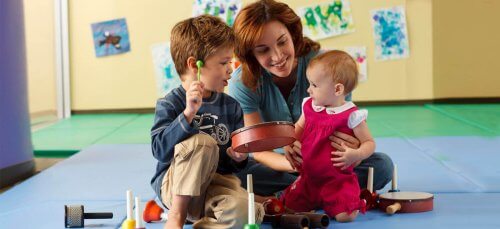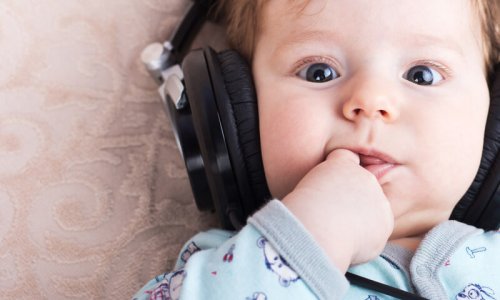Music Can Boost Your Children's Creative Process


Written and verified by the social educator Natalia Cobos Serrano
Music can work wonders for a child’s development process. It can be the nexus between mind and body, giving children essential life skills for their future. However, can music boost your children’s creativity?
“Every child is an artist, the problem is staying an artist when you grow up.”
–Picasso–

Is creativity an innate trait?
The higher the number of ideas a person has, the more creative they will be. This is known as divergent thinking, which is the ability to come up with a great number of answers to one single question, for example. On the other hand, a convergent thinker will only be capable of giving one correct answer.
The relationship between music and creativity is of great interest, and many studies are trying to figure out whether creativity is innate, or if it can be developed.
Parag Chordia, musician, mathematician, and director of The Music Intelligence Lab has proven that music can be a key element in your creative process. For Chordia, creativity can be found in everybody. So, how can you develop your creativity to the fullest?
“The important thing for you is to be alert, to question, to find out, so that your own initiative may be awakened.”
–Bruce Lee–

How does music boost creativity in children?
Every child is born with a set of skills and abilities, including his or her creative process. However, just like any other skill, creativity should be practiced too.
Musical pedagogue, and sometimes composer, R. Murray Schafer states that music can encourage children to develop their analytical and problem-solving skills. Music can help them develop their reasoning abilities and help them adapt to any situation. In short, music can boost our creative process.
Thus, music can influence children. This makes it the best method to help boost creativity and cognitive skills in children.

Developing children’s creative process through music
Music can stimulate your children’s imagination, which is an essential part of their creative process. When you’re listening to a song you love, this can change how you feel, creating images in your head, and boosting your creative process.
Schafer states that teaching children music can help them discover their creative potential. On that basis, there’s a need to involve music in children’s learning curve.
Nowadays, children are involved in a very stimulating environment, and they’re constantly listening to music. However, they often don’t get enough musical stimulation at school.
Understanding just how much music can boost your children’s creativity, it’s important to encourage a better musical interaction at home and school.
“Without music, life would be a mistake.”
–Friedrich Nietzsche–
Music can work wonders for a child’s development process. It can be the nexus between mind and body, giving children essential life skills for their future. However, can music boost your children’s creativity?
“Every child is an artist, the problem is staying an artist when you grow up.”
–Picasso–

Is creativity an innate trait?
The higher the number of ideas a person has, the more creative they will be. This is known as divergent thinking, which is the ability to come up with a great number of answers to one single question, for example. On the other hand, a convergent thinker will only be capable of giving one correct answer.
The relationship between music and creativity is of great interest, and many studies are trying to figure out whether creativity is innate, or if it can be developed.
Parag Chordia, musician, mathematician, and director of The Music Intelligence Lab has proven that music can be a key element in your creative process. For Chordia, creativity can be found in everybody. So, how can you develop your creativity to the fullest?
“The important thing for you is to be alert, to question, to find out, so that your own initiative may be awakened.”
–Bruce Lee–

How does music boost creativity in children?
Every child is born with a set of skills and abilities, including his or her creative process. However, just like any other skill, creativity should be practiced too.
Musical pedagogue, and sometimes composer, R. Murray Schafer states that music can encourage children to develop their analytical and problem-solving skills. Music can help them develop their reasoning abilities and help them adapt to any situation. In short, music can boost our creative process.
Thus, music can influence children. This makes it the best method to help boost creativity and cognitive skills in children.

Developing children’s creative process through music
Music can stimulate your children’s imagination, which is an essential part of their creative process. When you’re listening to a song you love, this can change how you feel, creating images in your head, and boosting your creative process.
Schafer states that teaching children music can help them discover their creative potential. On that basis, there’s a need to involve music in children’s learning curve.
Nowadays, children are involved in a very stimulating environment, and they’re constantly listening to music. However, they often don’t get enough musical stimulation at school.
Understanding just how much music can boost your children’s creativity, it’s important to encourage a better musical interaction at home and school.
“Without music, life would be a mistake.”
–Friedrich Nietzsche–
All cited sources were thoroughly reviewed by our team to ensure their quality, reliability, currency, and validity. The bibliography of this article was considered reliable and of academic or scientific accuracy.
- Bernal, J. (2001). Educación musical escolar y desarrollo de la creatividad. En I Congreso de Creatividad y Sociedad. Barcelona: Universidades de Barcelona.
- Casas, M. V. (2001). ¿Por qué los niños deben aprender música?. Colombia Médica. Vol 32, nº 4, pp- 197-204. Colombia: Cai.
- Schafer, M. (1983). El compositor en el aula. Buenos Aires: Ricordi.
This text is provided for informational purposes only and does not replace consultation with a professional. If in doubt, consult your specialist.








